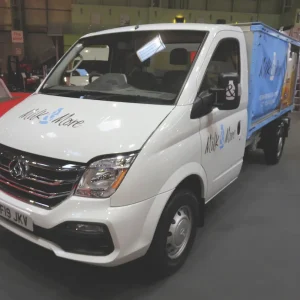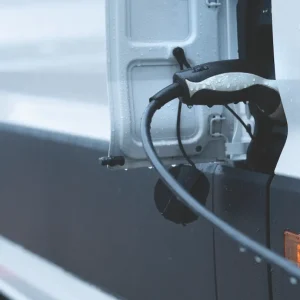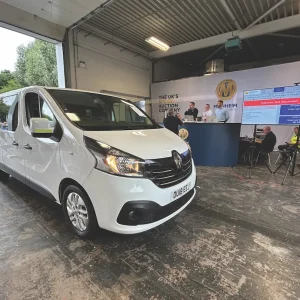Conversions are vital for companies requiring vehicles suited for specific purposes, whether this is an off-the-shelf body or something more bespoke tailored for a niche task.
The three stalwart offerings of tipper, dropside and box (or Luton van) satisfy most needs, and all the main van manufacturers run conversion schemes for their large vans. Citroen has recently expanded its Relay-based Ready to Run range of ready-bodied models and at the 2017 CV Show it displayed a new car transporter built by Advanced KFS.
The CV Show also saw Toyota unveiling converted Proace medium van and Hilux pick-up options through its Trade Plus programme, which aims to provide ready-made solutions for the most popular customer requirements. Volkswagen has begun to invest heavily in its conversion programme to ensure its nationwide Van Centre network is well-stocked with demonstrators and drive-away models, with the aim of reducing lead times and legwork for both dealerships and customers alike.
The brand sold just over 7,100 Crafter vans – the base vehicle for most of its conversions – in 2016 out of 45,358 LCVs in total. Its market share overall in the sector weighing up to 3.5 tonnes topped 12%, but its share of the conversion sector was just 4% of the nearly 50,000 converted LCVs registered by the Society of Motor Manufacturers and Traders.
Nick Axtell, specialist sales manager for Volkswagen Commercial Vehicles, expands: “Clearly this means we have a great opportunity in the conversions sector – one which is opening up thanks to the introduction of the new Crafter, which made its UK public debut at the CV Show in April.”
VW’s Engineered to Go programme kicked off back in 2007. It is made up of a tipper, dropside, and, since 2014, a Luton van. While these are the biggest sellers, Axtell explains that it is vitally important for the manufacturer to offer a full range of bodies and ensure it has the right vehicles to suit its customers’ complex needs. Hence it offers more niche products under its Engineered for You programme.
“After taking a close look at our own brand and Van Centre network it was clear that we had not made the business of vehicle conversions as simple as it could be,” says Axtell. “We took a lot of time to work with Van Centres to understand the blockers they felt needed resolving, and importantly with our customers to understand their needs in this area.”
Creating a bespoke offering for customers is becoming vital for the success of conversion programmes and Volkswagen’s Converter Recognition Programme underpins both its Engineered to Go and Engineered for You programmes, allowing its network to source off-the-shelf as well as a range of bespoke conversions to meet customer needs.
Axtell explains: “Engineered for You are our more bespoke versions – for example, minibus, refrigerated, cherry pickers. For these we work with a group of accredited convertors.”
In addition to a rigorous audit, the new programme introduces a number of quality and technical criteria to which the converter partners must adhere. “These alterations have been specifically developed to improve quality, simplify the process, increase in-life support and improve customer convenience,” Axtell says.
He adds that one of the main aims of the conversion programme is to be easy, consistent and convenient to use through the network. “It’s about not treating conversions as something ‘odd’ or ‘difficult’ – they’re absolutely business as usual,” he says. “We want to integrate conversions into business wherever possible, grow confidence in conversion sales through training and information, as well as be the manufacturer of choice for converters and vehicle of choice for the customer.”
Volkswagen is also incorporating conversions in its Digital Sales Aid. “This is an iPad-based tool our network can use to support their conversations with the customer,” explains Axtell. “One of the really great elements is ‘smart questions’. This can help to guide the sales person to a vehicle based on customer needs, putting the customer first.
“Selling the conversion at the initial point of sale can also result in a residual value uplift, which, of course, is great news for customers,” adds Axtell, referring to the fact that the rise in RVs is due to the conversion coming with the same manufacturer warranty as a standard vehicle.
Master builder
Renault has also upped its conversions game in recent years and claims it is able to satisfy around 75% of customers with its factory-built tipper, dropside, box van and Luton low-loaders.
SMMT data shows that around 20-25% of Masters – the vehicle used for most Renault conversions – are converted products. Additionally, most vans have some adaptations before they are registered, including racking and other internal fitments, ply-lining, beacons and roof racks, for example. The off-the-shelf models are complemented by bespoke products. Steve Wilson, Renault UK LCV product manager, explains: “Off-the-shelf factory conversions are listed in our brochures and price guides, and are sold as complete products by our dealers in exactly the same way as a standard panel van. These include tippers, dropsides, minibuses, crew vans, box vans and Luton low-loaders.”
Just like standard Renault vans, these offerings come with the full four-year warranty and roadside assistance provided by the manufacturer and the same quality assurance as the rest of the range. Wilson says: “Because they are price-listed versions, they also have a Cap code [an identifier used by RV experts Cap] and a residual value that includes the converted element, which can be used by leasing companies. Furthermore, all aftersales support for these products can be managed in our network, regardless of whether the issue is with the base vehicle or the conversion.”
Renault also allows for a range of Trafic and Master base vehicles to be built specifically for conversion by bodybuilders in the UK. These include Master platform cabs, chassis cabs, chassis double-cabs, Master Trabus models and Trafic platform cabs. Many of these go to Renault UK Accredited Converter Partners for onward development into its Tailormade Accredited range.
“Accredited Converter Partners have received Renault approval after being assessed on their technical and quality standards by a dedicated team,” says Wilson. “The Tailormade Accredited range has been developed with these expert partners to meet common requirements. Popular specialist vehicle types include refrigerated vans, minibuses, grounds maintenance vehicles and welfare vehicles. Vehicles can also be adapted to suit specific customer requirements, providing a truly tailor-made solution.”
Renault also offers bespoke products to meet a business’s specific needs, either through a UK Accredited Converter Partner, or a converter of the customer’s choice. “From cherry-pickers, to car transporters, catering vans or horseboxes, we can provide a product to suit most customer requirements,” Wilson says.
The manufacturer operates a Europe-wide approval scheme for converters, and around 40 converters in the UK have joined to become Renault UK Accredited Converter Partners.
The volume of work Renault does with each depends on their specialist area. The number of ‘off-the-shelf’ tippers through VFS and Luton low-loaders through Trucksmith are growing, explains Wilson, who adds: “Many other converters are also producing increasing numbers of vehicles on Renault chassis – for example, Coolkit, producing refrigerated vehicles, and GM Coachworks building minibuses. We also offer support to other converters who are not on the approved panel, and we make our guidelines and technical information available to all converters.”
Wilson concludes: “Welfare vans are a great example of a growth area, as more companies discover the advantages of a vehicle that can provide facilities for a workforce constantly on
the move.”
And now for some names behind the brands…
Buckstone Group currently works with Citroen and Peugeot where it holds full European Type Approval for its bodywork on the Relay and Boxer range of chassis cabs. Peter Dugdale, company secretary, explains: “Luton vans, box vans, curtainsiders, flat beds and dropsides are the vans we do most. We produce a range of standard sizes and are able to offer bespoke dimensions too. We fit tail lifts to our conversions and are also able to fit tail lifts to other manufacturers’ factory programme-converted vehicles.”
Trucksmith produces a range of low-loading Luton vans, including the Renault Master LoLoader, Vauxhall Movano KneeHi and Fiat Ducato Canniloader. It has also recently launched a dropside based on the low-roof Renault Trafic Platform that introduces a secure loading space to the traditional dropside flatbed van. Trucksmith tells WhatVan? it will also soon be revealing a new Nissan conversion.
VFS provides a “one-stop shop” chassis conversion initiative for Ford, Renault, Vauxhall, VW, Fiat and Renault Trucks, offering tipper, dropside, Luton and curtainsider conversions. “We also provide a great number of additional options to suit the end users’ work requirements,” claims UK marketing director Ashley Morris. “Although we do not provide bespoke conversions, we do find that all our options in combination provide 99% of end users with a vehicle which fits their vehicle utilisation requirements.”





